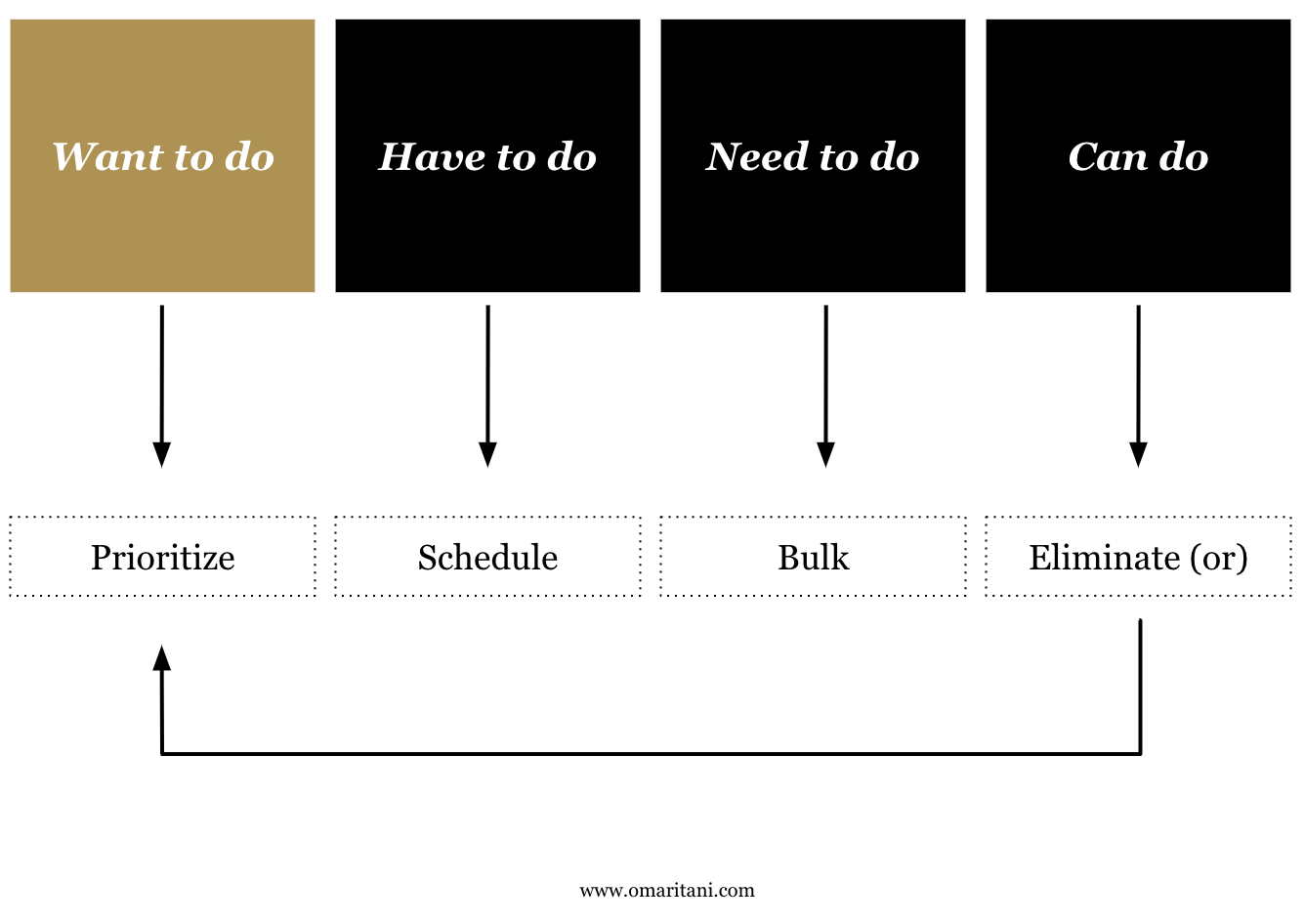The Four Buckets: A Task-Management System for Higher Productivity
Photo from Pexels.com
“Do you consider yourself to be productive throughout the entire working day?”
Researchers asked this question to over 2,000 office workers in a study to determine how productive the average individual is in a given eight-hour workday.
The study went on to reveal that the average worker is only productive for two hours and 53 minutes.
Between coffee breaks, meeting movements, colleague chats, browsing the web, going for snacks, talking on the phone, and scrolling through social feeds, it’s no surprise that we average just three productive hours per day.
And here’s the reality we aren’t often conscious of:
Time lost can never be recouped.
So if you’re not protecting your time or managing it properly and dedicating it to work that matters to you, you’re essentially giving your time away to tasks that do not align with where we wish to take your life. You end up doing work for the sake of doing it…
And each of us has 24 hours in a given day.
Which brings me to my next point:
How we spend those hours will determine how productive we are, and where we invest those hours will determine how effective we are in doing work that truly matters to us.
And there lies the distinction:
Productivity is not measured by the number of hours of work you do, it’s measured by how much meaningful output you squeeze out of those hours.
So where does that leave us?
You need a daily task-management system that meets these two goals:
It helps you manage your tasks so that in the few productive hours per day you do work that matters to you.
It helps you manage your time so that you ensure that every day is a productive day that forwards your agenda (and not someone else’s).
Enter The Four Bucket System.
The Four Buckets: A Daily Task Management System
Every day, take a look at the tasks that you have and list them under one of these four buckets.
Want to do: List the most important tasks that matter to you. Usually, these tasks are the ones that are aligned with your goals. These are the tasks that if you accomplish in a given day, you’ll feel satisfied with that day. For instance, what I want to do every day is write because it aligns with me being a writer. Writing is a priority. Another one is meditation—it helps me stay calm and focused, so I prioritize it.
Have to do: Two types of tasks fall into this category. The first type is maintenance tasks. These are the tasks that keep your business running (ex: bookkeeping, prospecting, marketing posts). Then there are the tasks that you have to do for someone else. For example, your manager asked you for a report, your client asked you for a presentation, or your accountant needs some documents to file your taxes. They’re both no fun, but you have to get them done.
Need to do: Whether important or not, these are the tasks that you need to get done. Sending or replying to emails, doing laundry, cooking meals, grocery shopping, cleaning your room, booking a dental appointment, replying to text messages, booking hotels for your upcoming vacation, etc… You can push them off and procrastinate on them, but eventually, you cannot run away from them.
Can do: In here, you can list everything else. Playing guitar, reading, browsing online for your next travel destination ideas, going out for after-work drinks, taking the afternoon off, signing up for an online course, etc… These are all the wonderful things you can do in your day that don’t necessarily fall into the above categories.
Here’s what you do after:
Prioritize what you want to do. As mentioned above, these are the tasks that are important to you and that align with your life goals. When you prioritize them, you consciously make the time for them. Writing, meditation, and exercise are important to me so I’ve prioritized them and built my schedule around them. I stretch and meditate in the morning and then I write for two hours per day, four or five days a week.
Schedule what you have to do. I had a call with my accountant last night, he needs me to arrange some documents for my taxes. I really don’t want to do it, but I have to, so I scheduled it in my calendar. Here’s why: If you don’t do the things you have to do, your actions are going to harm you and your relationships. If I stall on my accountant, it’s going to negatively reflect on my professionalism and it’s going to create a conflict. So if you have to do it, schedule it and get it done (and use this 10-minute rule to beat procrastination).
Bulk what needs to be done. These are the little tasks that don’t require much cognitive attention, so do them in bulk. Don’t check your emails six times a day, it reduces your productivity by up to 40%. Instead, bulk it into three sessions. Don’t go buy groceries every-time you need an item, bulk-shop, and preserve your energy. Same with house cleaning and laundry—bulk it!
Eliminate (or prioritize) what you can do. Look, there’s a lot of things you can do, but just because you can, doesn’t mean you should. For any task that falls under this bucket, ask yourself one of these two questions: “Do I want to do this?” or “Will this help forward my goal?”If it’s a yes, prioritize it. If it’s a no, eliminate it. Simple.
Do More of What Matters to You and Do it Productively
Your time is precious so don’t give it away to tasks that are irrelevant.
The idea isn’t to become more efficient in your day because that’s useless if you’re investing the time in tasks that are irrelevant. That the idea is to do more of what matters to you and to do it productively.
“Perfection is achieved, not when there is nothing more to add, but when there is nothing left to take away.”—Antoine de Saint-Exupéry
Consider the distinction above and you might just achieve perfection.

